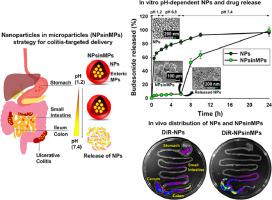Acta Biomaterialia ( IF 9.7 ) Pub Date : 2020-09-13 , DOI: 10.1016/j.actbio.2020.09.017 Muhammad Naeem 1 , Juho Lee 2 , Murtada A Oshi 2 , Jiafu Cao 2 , Shwe Phyu Hlaing 2 , Eunok Im 2 , Yunjin Jung 2 , Jin-Wook Yoo 2

|
Nanoparticle (NP)-based drug delivery systems accumulate in the disrupted epithelium of inflamed colon tissue in ulcerative colitis. However, premature early drug release and uptake or degradation of NPs during their passage through the harsh gastric or intestinal environment compromise their therapeutic outcomes. This study aimed to develop an advanced colitis-targeted hybrid nanoparticles-in-microparticles (NPsinMPs) drug delivery system to overcome the aforementioned challenges. First, sustained drug releasing poly(lactic-co-glycolic acid) NPs were generated and further encapsulated in pH-sensitive Eudragit FS30D MPs to ensure complete drug protection in a gastric-like pH and for selective delivery of NPs to the colon. SEM and confocal microscopy for the NPsinMPs revealed successful NP encapsulation. NPsinMPs prevented drug release in an acidic gastric-like and intestinal-like pH and presented a sustained release thereafter at an ileal and colonic pH, indicating the degradation of the outer pH-sensitive MPs and release of NPs. Furthermore, in vivo imaging of gastrointestinal tract of a colitis mouse orally administered with fluorescent NPsinMPs revealed higher fluorescence intensities selectively in the colon, demonstrating the release of loaded NPs and their concomitant accumulation at the site of colon inflammation. NPsinMPs markedly mitigated experimental colitis in mice indicated by improved histopathological analysis, decreased myeloperoxidase activity, neutrophils and macrophage infiltration, and expression of proinflammatory cytokines in colonic tissues compared with NP-treated mice. The present results show the successful formulation of an NPsinMP-based drug delivery system and provide a platform to improve NP-based colon-targeted drug delivery through improved protection of encapsulated NPs and their payload in the early small intestine.
中文翻译:

靶向结肠炎的混合纳米颗粒-微粒复合系统,用于治疗溃疡性结肠炎。
基于纳米颗粒(NP)的药物输送系统蓄积在溃疡性结肠炎中发炎的结肠组织的破裂上皮中。然而,过早的早期药物释放以及NP在其穿过恶劣的胃或肠环境期间的摄取或降解会损害其治疗效果。这项研究旨在开发一种先进的靶向结肠炎的纳米微粒-纳米杂化药物(NPsinMPs)给药系统,以克服上述挑战。首先,产生持续释放药物的聚(乳酸-乙醇酸共聚物)NP,并将其进一步封装在对pH敏感的Eudragit FS30D MP中,以确保在胃样pH中完全保护药物并选择性地将NP递送至结肠。NPsinMP的SEM和共聚焦显微镜显示成功的NP封装。NPsinMPs在酸性胃样和肠样pH中阻止药物释放,此后在回肠和结肠pH中呈现持续释放,表明外部pH敏感MPs降解和NPs释放。此外,口服给予荧光NPsinMPs的结肠炎小鼠胃肠道的体内成像显示结肠中选择性地具有更高的荧光强度,表明了负载的NPs的释放以及它们在结肠炎症部位的伴随积累。与NP处理的小鼠相比,NPsinMPs显着减轻了小鼠的实验性结肠炎,改善了组织病理学分析,降低了髓过氧化物酶活性,中性粒细胞和巨噬细胞浸润,并在结肠组织中表达了促炎细胞因子。

























 京公网安备 11010802027423号
京公网安备 11010802027423号